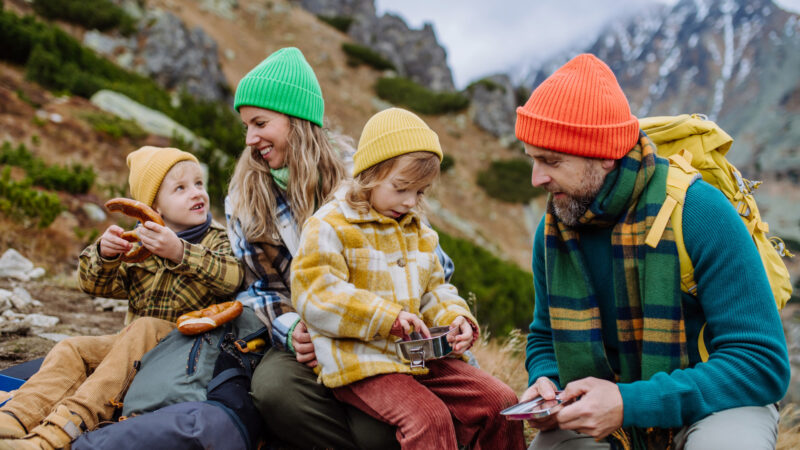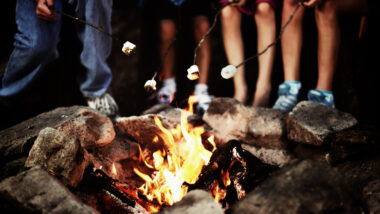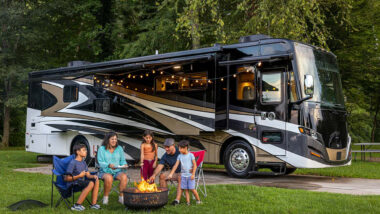Table of Contents Show
If you’ve hiked for any length of time, you know how important hiking snacks are to your overall mood and energy level. It’s hard to get pumped up to climb a steep incline when your body is suffering from a sugar crash.
It’s also hard to look at that mile marker and know you have three more miles to go when your body has no energy. Hiking snacks are critical to refueling your body and providing the nutrients you need when you’re on the trails for the day.
Let’s look at some delicious hiking snacks you can add to your hiking sack the next time you lace up your boots!
What Are Hiking Snacks?
Whenever you’re heading out on a hike, it doesn’t matter how long or short it is. You need more than just water. Even if you’re only hiking for an hour, you’ll burn hundreds of calories and will need to replenish them.
Hiking snacks are lightweight, calorie-dense, and nutrient-dense snacks you can take along with you. They easily fit in a backpack and provide a boost of energy when you need it.
You also want to pack snacks that don’t result in much trash. If you do have wrappers or bags, make sure to pack out what you bring in.
Why Do Hikers Eat Chocolate?
Dark chocolate is a calorie-dense food. Since hikers burn around 600 calories per hour, many calories need replacing during a day-long hike. Fat provides nine calories for every gram. Because dark chocolate is high in fat, it’s an excellent choice for hikers.
Also, unlike other sugary candies, dark chocolate has just enough simple carbohydrates to give hikers a boost of energy without the sugar crash.
Hikers also enjoy the caffeine and endorphin boost to give their bodies and minds the extra stimulation they need.
Are Sweets Good for Hiking?
In general, sweets aren’t good for hiking. Don’t load up on simple carbohydrates because the energy isn’t long-lasting. You don’t want the spikes and crashes that accompany these foods.
You need hiking snacks to fuel you long-term for day-long hikes, replenishing calories you’ve lost and refueling your body with complex carbohydrates, fats, and proteins.
What Do You Eat Leading Up to a Hike?
Although everyone has a different routine and various foods that help them perform at a high level, most hikers will eat certain foods before heading out on the trail.
These include foods with complex carbohydrates, fats, and lean proteins like peanut butter, bananas, yogurt, oatmeal, nuts, and raisins. Sometimes this takes a bit of trial and error to figure out how your body responds to certain foods.
You certainly don’t want to hit a wall when you’re a couple miles into a 10-mile hike.
If you’re heading out for an early morning hike, fuel up with a breakfast of eggs or whole-grain oatmeal.
Avoid sugary cereal. If you’re hitting the trail later in the day, eat a whole-wheat sandwich, brown rice, low-fat yogurt, and fruits and vegetables. Carbs are key, but you want to eat easily digestible carbs.
What Foods Should You Avoid While Hiking?
You don’t want to snack on anything salty or sweet. First, these snacks will cause you to drink more water. Plus, added sugar may boost energy for a short time, but you’ll crash later.
Additional foods to avoid include bulky or heavy snacks as well as perishables. You don’t want to weigh down your backpack, and you don’t want to have to worry about keeping food cold while hiking. They may be healthy – like humus, cheeses, and vegetables – but they’ll spoil.
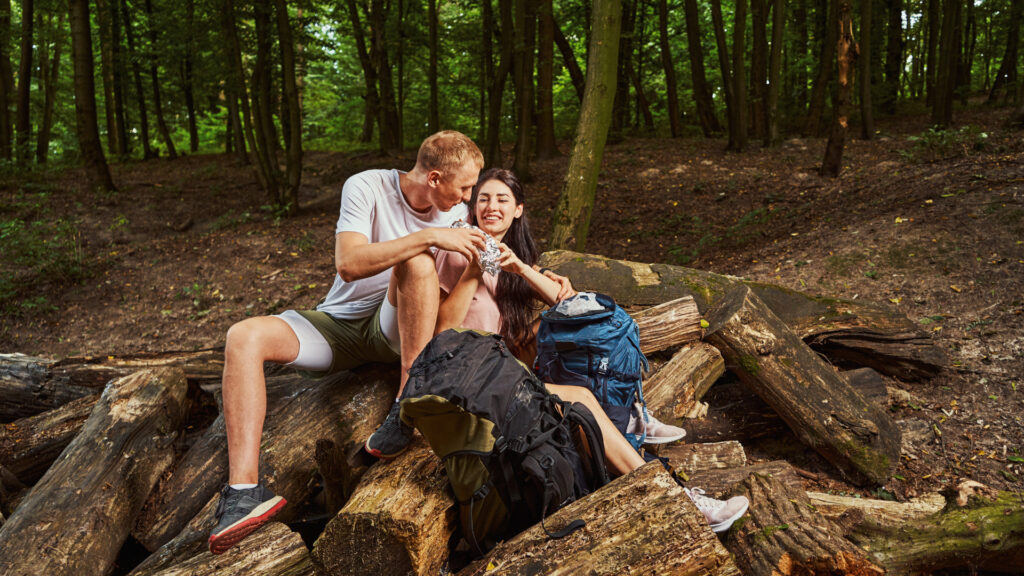
Delicious Hiking Snacks to Fuel Your Adventures
Whenever you’re snacking during a hike, you want nutrient-dense foods.
If you’re on a longer day hike that will last seven or eight hours, you need to snack about once an hour. You might even double your normal intake of carbohydrates.
Trail Mix
Depending on what you put in your trail mix will depend on what kind of nutrients your body receives. Add nuts, dried fruits, and granola to have a healthy combination of fats and carbohydrates.
If you’re going to buy a pre-made trail mix, look for no sugar added and no salt added varieties.
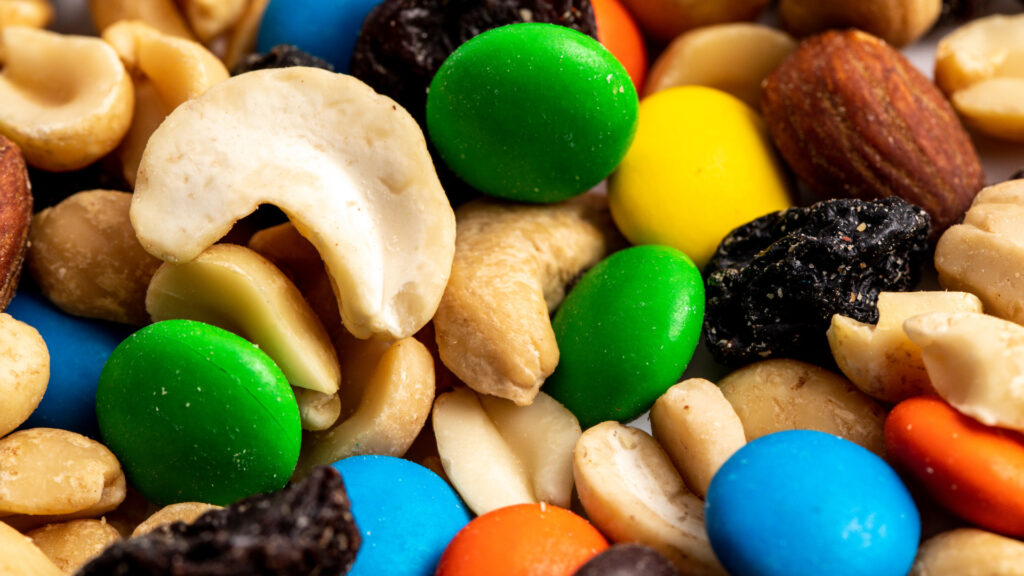
Jerky
Jerky is high in protein, which your body needs to refuel. But it can also be salty or high in added sugar.
Make sure to choose a brand and flavor that won’t cause you to get too thirsty or cause you to crash a mile down the trail. This dried meat is easy to throw in a backpack without worrying about keeping it cool.
Tuna/Chicken Packets
Meats and eggs are high in protein. But you can’t really pack them in your hiking sack. A great alternative for a high-protein snack are the tuna/chicken packets.
They don’t require refrigeration, and the packets can be smashed in your backpack without harming the food inside. Pack some crackers for a hiking snack high in protein, fats, and carbohydrates.
Keep in Mind: It’s Illegal to Hike to Mossbrae Falls, but many hike it anyway! Click the link to see why this hike is illegal
Granola
When choosing granola cereal and bars, look for options with no sugar added.
You want the increased carbohydrates but not a sugar crash. Granola is high in fat and calories, which you’ll need to replenish your energy on a long hike.
Fresh Fruit
When choosing fresh fruit for a hike, consider packing fruits like apples or pears that won’t get smashed in your backpack. Or pack blueberries or blackberries in a container.
If you choose a soft fruit like a banana, you might have a mess on your hands when it’s time for a snack. Fruits have vitamins and nutrients your body needs as you exercise.
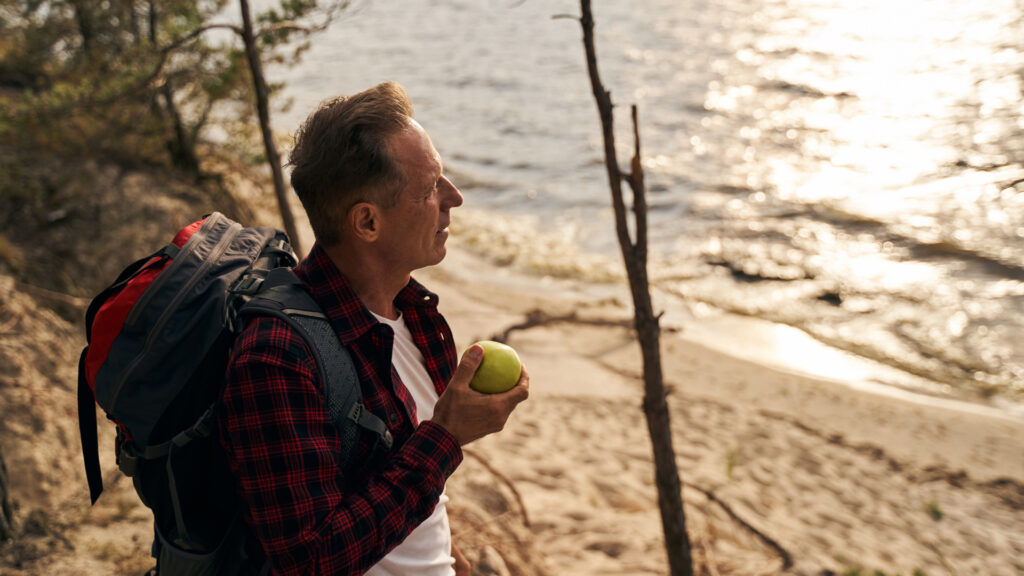
Protein Bars
Your body needs protein to keep your muscles going during a long hike.
A high-quality, low-sugar protein bar is a great snack to take hiking to refuel and supplement your muscles. You might also see “energy bars” in the grocery store.
Crackers
Like granola, crackers are high in carbohydrates, which will fuel your body. There are so many choices that you can find numerous options like Goldfish, Triscuit, and Wheat Thins.
You might also want peanut butter crackers or cheese crackers to add some protein. Squeeze some tuna or chicken on the crackers for added protein.
Keep in Mind: How Many of These Camping Food Favorites Have You Tried? Let’s find out!
Dried Fruit and Nuts
Sometimes dried fruit is an even better option than fresh fruit because you don’t have to worry about chilling it or preventing bruising or squishing during transport. Nuts are high in healthy fats, carbohydrates, and proteins.
However, keep in mind that dried fruit and nuts will make you thirsty. Pack enough water not only for the hike itself but also for snack time.
Granola Bars
As mentioned above, choose granola bars with no sugar added. Don’t grab the caramel and chocolate-covered ones with 12 added grams of sugar.
Instead, choose a dried fruit option where you’ll get the sugar naturally. Granola bars are also hiking snacks high in carbohydrates, fats, and calories.
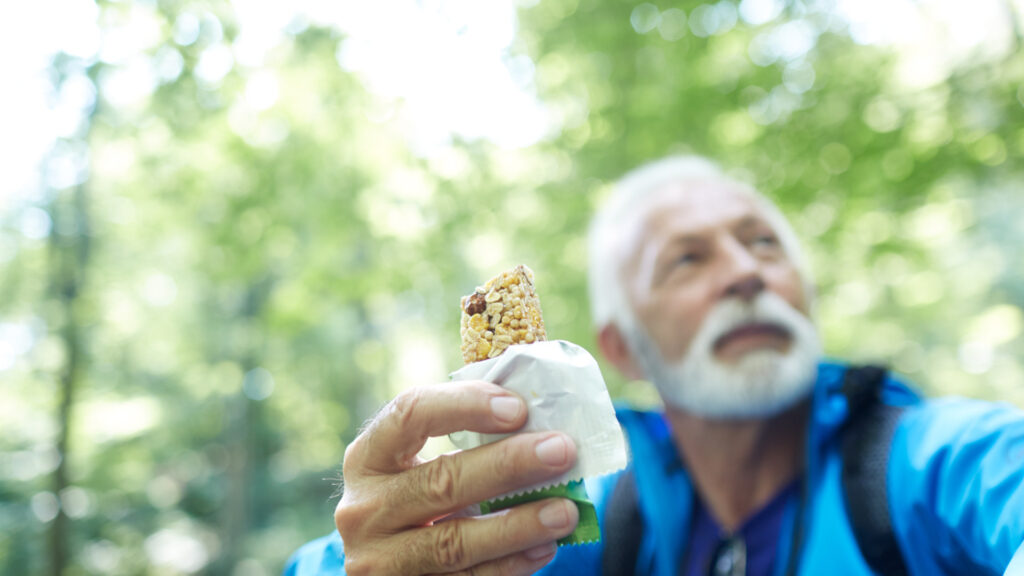
Candy Bars
It may seem contradictory to pack a candy bar when you’ve packed low-sugar granola and protein bars. But some candy bars offer calorie-dense hiking snacks to replenish those calories you’ve lost during the hike.
Snickers are one of the top candy bars hikers throw in their backpacks to provide a quick boost of energy before they hit up a steep incline.
Explore Some Trails with Delicious Hiking Snacks
When hiking, don’t worry so much about healthy choices but rather about calorie-dense options. You want low water-content hiking snacks so you’re not eating empty calories.
Also, consider who you’re hiking with. If you have kids, pack snacks they’ll eat because they need to replenish those lost calories, too.
So load up on those complex carbohydrates, fats, and proteins and hit the trails. Do you have a favorite hiking snack you never forget to pack?




